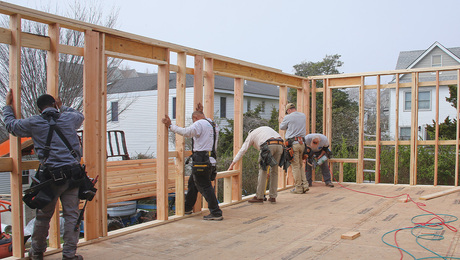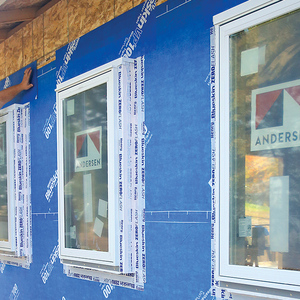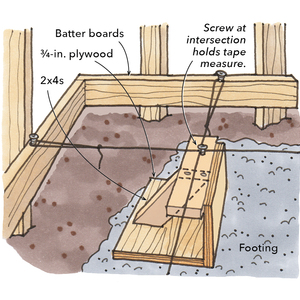I was putting together a flight of exterior stairs to a deck, and I wanted it to look nice so I was predrilling my screw holes and countersinking them. (Takes extra time, but it cuts down on splits) Anyhow, I realized how extremely dull my bits really are, VermontAmerican, titatnium 3yrs old, the ones that arent broken might as well be. So I was looking in the HD flyer that came the other day, the have a 20pc bosch drill bit set for $30, and it is titanium verses a blu-mol set of 21 for $20, the blu-mols are ferrous oxide. I think the titanium is worth the extra money (Thats what i’ve heard) but what to you all think?
AJH



















Replies
Those pretty yellow drills are the only ones that break consistently (especially the smaller diameters 3/16 and below).
I'm still using a set of numbered drills (0-60) that I've had for about 30 years so I don't think it's my technique. The so-called longer lasting harder drills are just too brittle, IMHO.
I'll not buy yellow again, unless it's DeWalt.<G>
Don't waste your money on those bits. Actually, the HD and most other hardware dept stores carry complete garbage when it comes to drill bits. A high quality high speed steel bit is light years ahead of those yellow colored bits. Do a search on the net and learn about the manufacturing of drill bits. Cobalt is considered a good quality bit for drilling SS but there are diffierent quality cobalt bits. You really need to know what you are buying. My cousin worked for Grumman on Long Island and gave me some high speed drill bits from the plant. These bits lasted longer than any other bit I ever owned and I used and abused them. I will tell you right now, you will pay for quality and 30 bucks for a pack of bits is peanuts. So think about what you are getting. "One measurement is worth a thousand expert opinions"
If you can find them try a M2 (steel quality) series bit. tough mothers. machinist supply. Dedicated nut, bolt and fastener wholesaler.
Try whole sale tool.
Who ever invented work didn't know how to fish....
One thing I can almost guarantee; you probably will never use all the bits. The two set sizes I see most often are: 15 piece (1/16 tp 1/2 by 32nds) and 29 piece (1/16 to 1/2 by 64ths). The latter set should run about us$75 for good-quality HSS, full jobber length, and with a decent indexed box.
What some guys do is to buy a cheapie set with a good box and replace the broken/worn-out bits with the good stuff. So, as you're sitting there with a good box full of scrap metal; ask yourself how many bits you really need, and then decide if this path makes sense for you.
Phill Giles
The Unionville Woodwright
Unionville, Ontario
I second Mr. Giles reply, get a good base set, then replace individually as needed. I bought a 20 piece Bosch Titanium COATED set of bits, and as I need to I replace them. Remember the bits arent titanium, they are just coated with titanium.
We got a 1/2 day rainout today(started drizzle when we were laying split face for a big warehouse, can't lay finish materials without mortar dripping down the faces...yea -ha) So I decided to try an experiment and stopped by Harbor Freight on the way home and picked up a 29 piece HSS bit set from China for 9.99, I even looked for the M2 stamp on the box. Got them back to the shop, chucked the 3/16" into the drill press and started drilling holes in some 1/8" square tbe stock. Cut real well, did maybe 50 holes, then I switched to 3/4" bar stock, still drilled good and fast, with pretty much one continous shaving that spriraled up the bit and twisted around it. Did a dozen of those..........Think I'm going back to get the 115 piece set for 34.99..... Drill Master was the brand, China made....what can I say?
Exactly, buy the cheap set and replace any that fail with a high-quality bit..
Phill Giles
The Unionville Woodwright
Unionville, Ontario
I seem to break pilot pits for my holesaw mandrels fairly regularly. I just bought a cobalt bit as an experiment to see if it is any tougher but I don't really know what kind of stress it is subjected to. I assume it is shear stress, if so does one steel offer better strength? I mainly use it to drill through plywood and occasionally sheet metal.
If you are all sharing your ideas on what drill bits to buy, does anyone have a good source for 1/4" bits in bulk. I would be just as happy buying them ten or more at a time (hopefully at a volume discount) and not having to feel the five bucks leave my wallet every time one snaps.
Karl
Anybody in the Seattle area should get most their bits from the Big Aerospace company surplus store. $1.75/# - of course, they are not sorted, but are freshly sharpened, just not 4 decimal place tolerance anymore.
Just raised the price to $1.7/# this year, used to be $1.00!!
Our local "professional" hardware/tool stores (Concord Hardware, I go to the one at Woodbine & Dennison, for example) all carry individual bits that they bought boxed in quantity (I think the number of bits/box changes with the size); but, in any case, they'll cheerfully sell you bits by the dozen or by the box; and they're surprising inexpensive. Even Lee Valley give a discount for volume (I think it's usually about 15% on >5 drill bits - they even publish "quantity" prices for many items)..
Phill Giles
The Unionville Woodwright
Unionville, Ontario
Cobalt bits keep a sharp edge better at high temperatures. They stay sharp even when glowing a dull red. Really good for drilling stainless and other tough steels where a regular High speed steel bit won't hold up. If you're actually breaking hole saw bits, it may be too much side force and I'm not sure cobalt will be a lot better. There is a big difference in how cutting tools are tempered. Harder is not always better. You certainly might get better service from a different brand, but unless you have a problem with bits getting dull too soon, cobalt may not be a lot different for you. Regular quarter inch bits and only a buck or less in quantity. You can easily grind a flat to use in a hole saw. MSC, McMaster Carr, Enco, Graingers all sell in bulk.
Your post makes sense in comparison to my experience.
I don't break bits often. When I do, they are the small sizes, and are cheap to replace. But I do burn bits up sometimes.
I used the titanium for a while, and they did seem to fare better than their plain hss counterparts, but seemed quite pricey for the small bit of difference.
Then I tried cobalt. They last long enough to definately be worth the price difference. They are a bargain, in the end. I still don't like the longevity of the really large, and more expensive bits, but you gotta pay taxes to the laws of physics, I guess.
My drill bit collection is one of the things that were stolen when I broke my back on the job. I have not had the money to replace it since.
I recieved a good set a while back. In a suitcase type case. A good all-around selection. All standard cheapo bits. But I have been careful with them, and they have done me well for a while.
When I can afford it, I will buy a cheap set with a really good index box, and start filling it with cobalt bits, through attrition, again.
Can't we all just get a log ? - Paul Bunyon
Quittin' Time
"Leaning" the hole saw over as you drill will break the piolet bit.
Who ever invented work didn't know how to fish....
A few tips a journeyman taught me about hole saws when I was just starting. I'm sure you know most of this but it bears repeating:
Hole saws break pilots when the saw part is canted or grabs unevenly or when it, either the hole saw or the pilot, breaks through under pressure repeating the first case.
On old work, like remodeling, using hole saws at odd angles and sometimes in two different materials at once is unavoidable. Binding of hole saws, particularly the larger ones over 2" diameter is to be expected. Be braced and prepared. Brace the drills handle counter the bit rotation if possible. Use the longer accessory handle if one is available.
Starting, drilling through on thinner materials, the pilot, or substituting a common 1/4" bit, with the hole saw off can save trouble when the hole saw is likely to grab. It also makes hitting a mark easier as the hole saw is not blocking the view.
To save time with smaller hole saws you can place a fender washer larger than the hole saw over the pilot bit. If the pilot suddenly breaks through the washer will slide smoothly over the surface instead of having the hole saw grab and mar the surface and/or break the pilot.
Another option is to drill the pilot, again you can use any cheaper, and more common 1/4" bit, and then substitute a short length of 1/4" rod, all-thread is usually pretty handy on my truck and works well, for the pilot bit. The softer steel of the rod stock is much less likely to snap allowing the hole saw to wander, the drill to lurch to the side and the ladder to fall causing you to need a ride to the emergency room. The rod stock tends to bend but not give up totally when torqued. Make all the difference in the world when your up high and in a lousy position.
Wax, available in sticks for saw blades, applied to both sides, inside and out, of the hole saw can make a considerable difference in how prone a hole saw is to binding. This is especially true when your drilling heart pine where the pine tar wants to gum up even small drill bits.
Variable pitch hole saws are less likely to bind or chatter. They are worth hunting down if you do a lot of work with hole saws. Milwaukee make one version of variable pitch hole saws.
4lorn1,
Thanks for passing on the bag of tricks. I like the idea of swapping out the drill for 1/4 rod. In my work I have an endless supply of 1/4 stainless rod
The wax idea sounds interesting and I plan to give it a try. Most of my drilling is either thru 5/8 plywood or redwood lumber.
I followed junkhounds advice about aerospace surplus and stopped at the swapmeet this morning. A vendor had a huge assortment of drills, burrs, etc. I got a bag of 25 1/4 bits in a baggie marked Northrup. Apparently they are surplus??? Ten bucks for 25 professionally sharpened bits seems like just what I needed.
Karl
IMHO IMERC is correct M2 is what you want for the greatest return of investment but look carefully at any of the HSS (High Speed Steel) bits at the home center, hardware or fastener specialty company. Good quality HSS is pretty common and usually rated M2.
Steel production has gotten better and more consistent with time and producing good HSS is not very much more expensive than the cheap stuff. On the shank you can, good light and a magnifier help, often find "HSS" and "M2" stamped even on "generic" bits. I have found a few bad ones but usually these generic bits, often supplied in bulk bags to supply houses are as good as any and are often being produced by major names but not labeled.
The pretty gold color, presumably titanium nitride, isn't very thick and not all that much tougher than M2 steel. It is harder but more brittle and it is often, from what I understand, usually coated over weaker steel so no big improvement.
As pointed out you can save money by buying the few commonly needed sizes instead of a full array more needed by a dedicated machinist.
To further save money learn to sharpen your bits. It isn't hard to do once you dedicate a few hours to learning and practice a little. In an afternoon most people can learn to sharpen bits by eye on a bench grinder and get a decent grind in just a few seconds. No fancy equipment needed. This is, IMHO, a valuable skill that can be quite impressive to anyone who doesn't know the technique.
Some time ago I posted a detailed walk-through of the technique. If I can find it I'll post back a link. In the long run learning this basic skill can save quite a lot of money, time, frustration and the occasional botched job.
20655.4
thanks - I've got it printed out and in the drawer under the bench grinder...
Titanium Nitride is a microscopically thin coating that increases the wear resistance of cutting tools. But, the underlying steel must be of the best quality. If you coat it on a cheap bit, it is purely decorative. If you coat it on a really good bit, it has some advantages when drilling many tough materials.
As has probably been said, go to a machinist's supplier for the best bits. Overall best value is probably HSS. The polished ones seem to hold up better for me rather than the black oxide. If you want really tough bits, get the 5% or 10% cobalt variety. Somewhat more expensive, but holds the edge better when the bit gets hot. Most good bits are available with and without the nitride coating. For drilling stainless or cast iron I'd get nitride. For general use, it doesn't seem to make a big difference for me. It is pretty, though. I have several sets of real cheap imported bits. Cost $9 for a 120 piece set in an index. 90% of them are now broken after a year. Also have a nice set of American made HSS drills (Cleveland Twist Drill brand I think). Still going strong after a decade or two.
Something to consider also is that with coated bits the coating wears off the cutting edge or is removed after the first resharp and then all you have left is a pretty drill drill bit that is the same as every ones else's.
My overall best results have been with American, German and Swiss made M2 bits. They seem to be the best bang for the buck. My favotite brand is TRW but watch for the origin of manufacturing. TRW along with the rest of them have some their bits made off shore as well as domesticly. There is a noticeble difference.
Who ever invented work didn't know how to fish....
I raised that same objection one time; I don't remember if it was on this forum or somewhere else. The reply was that if the drill is sharpened correctly, there is only line contact on the edges. Most of the friction is on the rake face, where the chip is being forced up the flute, and the coating is still intact on that face.
ARIEL,
Just my two cents. The best drills you can buy for general purpose drilling are 5% cobalt, and 10% if you are drilling into an easily work hardenable alloy like stainless steel or 4150. Coatings have there purpose, but don't really do much in general use. I would speculate a 5% cobalt would keep an edge at least 10X longer than a ti-ni coated HSS bit.
Jon
Ariel
Just my 2 cents worth.
I bought 6 or 8 of the real cheap sets. Keep 2 sets with each drill.
Most of the time I use only 2 or 3 small sizes.
I buy packages of 12 bits (high quality) in the sizes I use the most, and use them to refill the sets when I dull or break a bit.
I then only buy a new quality bit now and then to replace the other sizes if one breaks or is really dull.
For the shop, I have 2 real high quality sets for the drill presses.
Seems to work for me.
Jeff